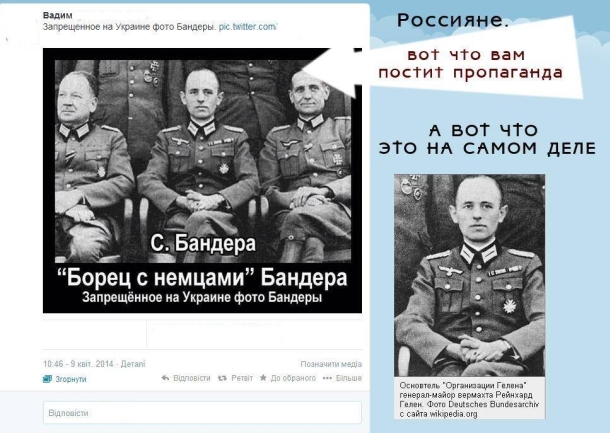I want to dispel a few myths about Stepan Bandera

I want to dispel a few myths about Stepan Bandera, which were invented as a scoop, and were supplemented with new unimaginable pearls during the revolution on Maidan.
Bandera in the documents of the Nuremberg Trials:
- Http://mysliwiec.livejournal.com/737438.html
- Http://newsland.com/news/detail/id/730506/
SBU proved: the NKVD committed crimes under the guise of the UPA
A terrible story about how the Bandera people killed children and tied them to a tree with barbed wire is just a juggling of facts.
The photo of these atrocities was placed by Polish psychiatrist Vitold Luniewski in his article "Psycho-szalowo posepnicza in forensic psychiatric casuistry" in the "Yearbook of Psychiatry".
This crime was committed by Tsiganka Marianna Dolinskaya against the backdrop of insanity in connection with her husband's arrest, poverty and hunger in 1923.
And already Alexander Korman and Jerzy Vegersky much later created a fake of this photo with barbed wire in order to hyperbolize the crimes of the UPA.
The tragedy in Khatyn is also credited to the Bandera people, but what does the favorite Wikipedia say to us:
"Khatyn is a village in Belarus, destroyed on March 22, 1943 by the punitive units of the auxiliary security police from the formation of a collaborationist formation formed in Ukraine, the 118th Shutzmanshaft battalion for the murder of several German servicemen by partisans."
Http://en.wikipedia.org/wiki/Hatyn
The 118th battalion of the security police is a collaborative juggling unit of the German auxiliary security police, formed in July 1942 in Kiev on the basis of one of the mouths of the 115th battalion of the security police and prisoners of war of the Workers 'and Peasants' Red Army.
Http://en.wikipedia.org/wiki/118-_shutzmanschaft_bathalon
The Volyn Massacre
Such a terrible event really answers the truth.
But you need to consider one "but"!
Vladimir Vyatrovich: "The Volyn tragedy is part of the Polish-Ukrainian war ... It was a war, an ugly war, with inherent World War II crimes, and these crimes, unfortunately, were committed both by Ukrainians and Poles ....
Directly this armed confrontation began already in the summer of 1942 in the Kholm region, continued in 1943 in Volhynia, and continued there until early 1944.
In 1944 Galicia became the arena of the conflict, where both the Polish and Ukrainian undergrounds were developed.
In 1945-1947, the war went beyond the Second World War and continues on the territory of present-day Poland, on lands that the Ukrainians called Zakersonn ...
The goal of using the method of narrowing down to Volhynia and in 1943 is obvious for me: to show the Poles as united victims, and Ukrainians as initiators.
Indeed, among the people who died in Volhynia - the majority of Poles, in contrast to, for example, Kholmschina, Zakersonia, where more Ukrainians died ...
Bandera UPA joined the spontaneous conflict between Poles and Ukrainians sometime in April 1943.
At that time, the peasant war was already aflame, it sat down against the village ... (* Bandera himself was at that time in the German concentration camp of Sachsenhausen). "
Http://www.istpravda.com.ua/articles/2011/07/12/45443/
Much is said about Bandera's collaboration with Hitler, but it turns out in 1941-1944 Bandera stayed in the German concentration camp of Sachsenhausen for not wanting to give up the "Act of Revival of the Ukrainian State."
In general, many new things can be learned about him, his activities and family from elementary biographies.
Http://en.wikipedia.org/wiki/Bandera._ Stepan_Andreevich
"Golden September. Chronicle of Galicia 1939-1941" A documentary film that tells about events in Western Ukraine before the beginning of the Great Patriotic War.
Https://www.youtube.com/watch?v=z_8spUsbh2c
Why and for what purpose is such a mass-hysterical distortion of facts - obviously, a rhetorical question.


Comments
When commenting on, remember that the content and tone of your message can hurt the feelings of real people, show respect and tolerance to your interlocutors even if you do not share their opinion, your behavior in the conditions of freedom of expression and anonymity provided by the Internet, changes Not only virtual, but also the real world. All comments are hidden from the index, spam is controlled.